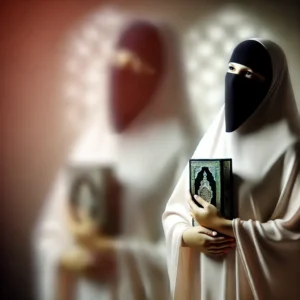The question “Can anyone be a Muslim?” is a profound one, rooted in the universal appeal and accessibility of Islam. Islam is a faith that is open to all, regardless of background, race, or previous beliefs. This article will explore the various aspects of what it means to become a Muslim, the requirements, the process, and the spiritual significance behind this decision, and more of the things inside this article you have to know.
What Are the Requirements to Become a Muslim?
To become a Muslim, the primary requirement is a sincere belief in the oneness of Allah and the finality of the Prophet Muhammad (peace be upon him) as His messenger. This belief is encapsulated in the Shahadah, the Islamic declaration of faith, which states: “There is no god but Allah, and Muhammad is the messenger of Allah.” Accepting this belief with full conviction is the core of becoming a Muslim. Additionally, there are no prerequisites in terms of prior religious knowledge or background, making Islam accessible to anyone who wishes to embrace it.
Read About: Learn Why do Muslims Dislike Christians
How to Declare the Shahadah
When someone asks, “Can anyone be a Muslim?”, the answer is yes, and it begins with the declaration of the Shahadah. The Shahadah, or the Islamic declaration of faith, is not just a set of words; it is a profound commitment that marks the beginning of one’s journey in Islam. This declaration signifies the acceptance of the core beliefs in Islam: the oneness of Allah and the prophethood of Muhammad (peace be upon him). Understanding how to declare the Shahadah and its significance is crucial for anyone considering embracing Islam.
Understanding the Shahadah
The Shahadah is composed of two essential parts:
1-“Ashhadu an la ilaha illallah” – “I bear witness that there is no god but Allah.”
2-“Wa ashhadu anna Muhammadan rasulullah” – “And I bear witness that Muhammad is the messenger of Allah.”
This declaration affirms the belief in the absolute oneness of Allah, rejecting any form of idolatry or polytheism. It also acknowledges Muhammad (peace be upon him) as the final prophet in a long line of messengers sent by Allah to guide humanity.
The Process of Declaring the Shahadah
For those wondering, “Can anyone be a Muslim?” the process is both accessible and profound. Declaring the Shahadah can be done in a simple, private moment or publicly, depending on the individual’s comfort and understanding. What matters most is the sincerity and conviction behind the words.
Here’s how to declare the Shahadah:
1-Preparation: Before declaring the Shahadah, it’s important to have a sincere intention (niyyah) to embrace Islam. This involves understanding the meaning of the Shahadah and what it represents. It is not merely a statement; it is a commitment to live by the principles of Islam.
2-The Declaration: The Shahadah should be recited aloud in Arabic: “Ashhadu an la ilaha illallah, wa ashhadu anna Muhammadan rasulullah.” This can be done privately or in the presence of witnesses, ideally, other Muslims who can offer support and guidance.
3-Seeking Support: While it’s possible to declare the Shahadah alone, having witnesses, especially in a mosque or Islamic center, can be beneficial. They can provide spiritual support, answer any questions, and help integrate the new Muslims into the community.
4-After the Shahadah: Once the Shahadah is declared, the individual is officially a Muslim. This signifies the beginning of a fresh chapter in life. New Muslims are encouraged to learn about the pillars of Islam, engage with the Muslim community, and begin practicing the faith in their daily lives. The journey of learning and growing in Islam is ongoing, and the community often plays a crucial role in supporting new Muslims.
The Importance of Sincerity
The key to declaring the Shahadah is sincerity. Islam emphasizes that faith must be genuine and heartfelt. Declaring the Shahadah without true belief in its meaning does not fulfill the requirements of becoming a Muslim. It is essential that the individual fully understands and accepts the core tenets of Islam.
The Importance of Ghusl (Ritual Purification)
One important aspect of the conversion process that is sometimes overlooked is the performance of Ghusl, or ritual purification, which is highly recommended when a person enters Islam. Ghusl is a complete washing of the body that symbolizes spiritual cleansing and the beginning of a new chapter in life.
Before declaring the Shahadah, it is recommended that the person performs Ghusl. This involves:
1. Intention (Niyyah): Like all acts of worship in Islam, Ghusl should begin with the intention to purify oneself for the sake of Allah.
2. Washing the Entire Body: The person should wash their entire body, ensuring that water reaches every part, including the hair and skin. This act represents the physical and spiritual cleansing that comes with accepting Islam.
3. Specific Steps: Ghusl typically includes washing the hands, mouth, nose, and then the entire body, starting from the right side and then the left. The process concludes with washing the feet.
Performing Ghusl before declaring the Shahadah is a symbolic act of purification, representing the washing away of past sins and the start of a new, clean slate in Islam. It is a powerful reminder that embracing Islam is not just a change in belief, but a renewal of the self, both inwardly and outwardly.
The Spiritual Significance of Ghusl
The act of Ghusl is deeply symbolic. When a person performs Ghusl before declaring the Shahadah, they are not just physically cleansing themselves but are also spiritually preparing to enter into a state of purity that is required for prayer and other acts of worship in Islam. This ritual washing is a way of presenting oneself in a purified state before Allah, ready to take on the responsibilities and blessings that come with being a Muslim.
Declaring the Shahadah After Ghusl
Once Ghusl is completed, the individual is ready to declare the Shahadah. This can be done immediately afterward, ideally in a peaceful and reflective environment. The Shahadah can be declared alone, or in front of witnesses, which is often preferred as it allows the individual to be welcomed into the Muslim community.
By performing Ghusl and declaring the Shahadah, the individual takes a significant step in their spiritual journey. This process not only marks their acceptance of Islam but also serves as a profound moment of transformation, as they commit to living a life guided by the principles of Islam.
Why the Shahadah Is Powerful
The act of declaring the Shahadah is not just a verbal commitment; it is a spiritual transformation. By declaring the Shahadah, an individual not only becomes a Muslim but also enters into a direct relationship with Allah. This relationship is based on trust, love, and obedience to the Creator. For many, the moment of declaring the Shahadah is deeply emotional and marks a turning point in their lives.
The Conditions of the Shahadah
While the Shahadah is simple in its wording, it carries a deep meaning and must meet certain conditions to be valid. These conditions include knowledge (knowing what the Shahadah means), certainty (having no doubt about it), acceptance (accepting it with the heart and soul), submission (willingness to submit to Allah’s commands), truthfulness (being truthful in one’s declaration), sincerity (declaring with pure intent), and love (loving Allah and His messenger more than anything else).
The Invalidators of Islam
While Islam is a faith open to all, certain actions and beliefs can invalidate a person’s status as a Muslim. These include acts of shirk (associating partners with Allah), denying the core tenets of Islam, or abandoning the practice of the religion. New Muslims need to be aware of these invalidators to maintain their faith and continue growing spiritually.
If You Have Committed Many Sins in the Past, You Can Still Become a Muslim
One of the most beautiful and profound teachings of Islam is its emphasis on mercy, forgiveness, and the opportunity for a fresh start. For anyone wondering, “Can anyone be a Muslim, even if they’ve committed many sins?” the answer is a resounding yes. Islam offers hope and redemption to all, regardless of their past.
Islam’s Message of Mercy and Forgiveness
Islam teaches that Allah’s mercy is boundless and His forgiveness is available to all who seek it sincerely. The Quran repeatedly emphasizes that no matter how grave a person’s sins may be, the door to repentance and forgiveness is always open. Surah Az-Zumar (39:53) states: “Say, ‘O My servants who have transgressed against themselves [by sinning], do not despair of the mercy of Allah. Indeed, Allah forgives all sins. Indeed, it is He who is the Forgiving, the Merciful.'”
This verse serves as a powerful reminder that Allah’s mercy is greater than any sin. Embracing Islam means not only accepting a new faith but also embracing the opportunity to have all past sins wiped away.
A Fresh Start with Conversion
When a person converts to Islam, they are given a clean slate. The act of declaring the Shahadah (the Islamic declaration of faith) symbolizes not just acceptance of the faith but also a complete forgiveness of all past misdeeds. This is a profound aspect of Islam that offers immense comfort and hope to those who may feel burdened by their past actions.
The Prophet Muhammad (peace be upon him) said, “Islam wipes out whatever sins came before it.” This hadith underscores the transformative power of embracing Islam. It’s not just a change in belief but a rebirth, allowing the individual to start anew with a clear conscience and a purified heart.
The Path to Spiritual Renewal
For many, the fear of being judged for past sins can be a significant barrier to embracing Islam. However, Islam teaches that no one is beyond redemption. The moment you decide to turn to Allah and embrace Islam, you begin a journey of spiritual renewal. The focus shifts from past mistakes to future growth, guided by the teachings of the Quran and the example of the Prophet Muhammad.
This journey is not about perfection but about striving to improve, seeking forgiveness, and building a closer relationship with Allah. The support of the Muslim community also plays a crucial role in helping new Muslims integrate and grow in their faith.
Continuous Personal Growth
Islam encourages continuous learning and personal development. From studying the Quran and Hadith to engaging in acts of charity and kindness, converts are encouraged to grow in their knowledge and practice of the faith. This focus on lifelong learning not only enhances spiritual understanding but also promotes intellectual growth and moral development. Converts often find that Islam’s emphasis on self-improvement leads to a more disciplined and purposeful life.
To support you on this journey of growth and spiritual enrichment, Al-Walid Academy offers a wide range of courses designed to deepen your understanding of Islam and the Arabic language. Whether you’re looking to memorize the Quran through our Quran Memorizing Course, improve your recitation with the Quran Reading Course, or gain a comprehensive understanding of Islamic teachings in our Islamic Studies Course, we have the right program for you. Additionally, our Arabic Language Course and Arabic Foundation Course are perfect for those who wish to master the language of the Quran. Join us at Al-Walid Academy and take the next step in your spiritual journey with expert guidance and a supportive learning environment.
sign up and book in the best Arabic and Quran Academy Learn Arabic Language And Quran Online
Benefits of Converting to Islam
Converting to Islam is not just a change in belief; it’s a transformative journey that touches every aspect of a person’s life. The benefits of embracing Islam extend far beyond the spiritual realm, offering a holistic approach to life that provides emotional, social, and intellectual growth. Here are some of the most significant benefits that come with converting to Islam:
1. A Deep Spiritual Connection
One of the foremost benefits of converting to Islam is the deep, personal connection it fosters with the Creator. Islam teaches that every human being has a direct line to Allah, without the need for intermediaries. This connection brings a profound sense of purpose, inner peace, and fulfillment. Through regular prayer, reflection, and recitation of the Quran, converts find themselves spiritually rejuvenated, with a clear path to follow in their relationship with Allah.
2. A Comprehensive and Balanced Way of Life
Islam offers a comprehensive way of life that guides individuals in every aspect, from personal conduct to social relationships, and from financial dealings to dietary habits. This holistic approach ensures that converts can find balance and harmony in their lives, knowing that their actions align with divine guidance. Whether it’s through the teachings on family life, business ethics, or community engagement, Islam provides a framework that promotes well-being and moral integrity.
3. A Global Community of Support
When someone converts to Islam, they become part of a global community of over a billion people. This sense of belonging is incredibly powerful, providing social support, friendship, and a sense of unity. Muslims around the world are united by their faith, and this shared identity fosters a sense of brotherhood and sisterhood that transcends cultural and geographical boundaries. For converts, this means access to a supportive network that can offer guidance, assistance, and companionship.
4. Continuous Personal Growth
Islam encourages continuous learning and personal development. From studying the Quran and Hadith to engaging in acts of charity and kindness, converts are encouraged to grow in their knowledge and practice of the faith. This focus on lifelong learning not only enhances spiritual understanding but also promotes intellectual growth and moral development. Converts often find that Islam’s emphasis on self-improvement leads to a more disciplined and purposeful life.
5. Emotional and Mental Peace
The teachings of Islam provide tools for managing life’s challenges with patience and resilience. The practice of regular prayer, meditation (dhikr), and reliance on Allah (tawakkul) helps reduce stress and anxiety, offering emotional peace. Converts often describe a profound sense of calm and mental clarity that comes from trusting in Allah’s plan and finding comfort in their faith.
Can Anyone Be a Muslim?
Islam is a universal religion that invites all of humanity to embrace its teachings, regardless of their background, race, nationality, or past. The essence of the faith is built on the belief that anyone who sincerely seeks the truth and wishes to submit to the will of Allah can become a Muslim. This inclusivity is one of the core strengths of Islam, emphasizing that the path to spiritual fulfillment is open to everyone.
The Universal Call of Islam
The message of Islam is not limited to a specific group of people; it is a universal message intended for all of mankind. The Quran states in Surah Al-Hujurat (49:13): “O mankind, indeed We have created you from male and female and made you peoples and tribes that you may know one another. Indeed, the most noble of you in the sight of Allah is the most righteous of you. Indeed, Allah is Knowing and Acquainted.” In Islam, the emphasis is placed on righteousness and piety as the most important qualities, transcending considerations of ethnicity, social status, or nationality.
What It Takes to Become a Muslim
To become a Muslim, one must sincerely believe in the core tenets of Islam. The foundation of this belief is encapsulated in the Shahadah, the Islamic declaration of faith: “There is no god but Allah, and Muhammad is the messenger of Allah.” This simple yet profound statement signifies a person’s acceptance of the oneness of Allah and the prophethood of Muhammad (peace be upon him). Anyone who utters this declaration with sincerity and understanding becomes a Muslim.
Inclusivity and Forgiveness
One of the remarkable aspects of Islam is its emphasis on forgiveness and new beginnings. No matter what a person’s past may look like, Islam teaches that when someone converts to the faith, all their previous sins are forgiven. This concept is rooted in the boundless mercy of Allah, who welcomes every sincere seeker with open arms. Islam encourages people to leave behind their past mistakes and start a new chapter of life filled with spiritual growth and a close relationship with their Creator.
A Personal and Conscious Decision
Becoming a Muslim is a deeply personal and conscious decision. It is not something that can be imposed or inherited but rather a choice made by the individual based on their conviction in the truth of Islam. This choice is a profound commitment to living according to the teachings of the Quran and the Sunnah (traditions of the Prophet Muhammad), seeking to lead a life of peace, justice, and devotion to Allah.
How to Become a Muslim Woman
The process of becoming a Muslim is the same for both men and women. However, after conversion, a Muslim woman is encouraged to learn about Islamic teachings specific to women, such as modesty, rights within marriage, and the importance of family life. Just like men, women are also expected to declare the Shahadah with sincerity and understanding, which marks the beginning of their journey in Islam.
Read More: Quran Verses About Women’s Rights
Are We Muslims by Chance or Choice?
Islam teaches that every person is born with a natural inclination towards faith, known as the “fitrah.” However, becoming and remaining a Muslim is a conscious choice. For those who convert to Islam, this choice is often the result of deep reflection, study, and a personal calling to the truth of Islam. This conscious decision to embrace Islam adds to the depth and significance of one’s faith.
Shahadah During Menstruation
For women, the state of menstruation does not prevent one from declaring the Shahadah. While certain acts of worship like prayer and fasting are not performed during menstruation, the declaration of faith is a personal and spiritual commitment that can be made at any time.
A Small Child Can Still Become a Muslim Without Parents’ Permission
In Islam, a child who has reached the age of discernment and understands the meaning of the Shahadah can become a Muslim, even without parental consent. However, the child’s well-being and family dynamics are important considerations, and it’s often encouraged that the decision be made with wisdom and care.
You have to read: What The Quran Says About Christianity
If You Convert Someone to Islam, Do You Go to Jannah?
While only Allah ultimately decides who enters Jannah (Paradise), guiding someone to Islam is considered one of the greatest acts of charity and righteousness. The Prophet Muhammad (peace be upon him) said that whoever leads someone to goodness will have a reward similar to that of the person doing the good deed. Converting someone to Islam can indeed be a path to earning great rewards in the hereafter.
Conclusion
In conclusion, “Can anyone be a Muslim?” The answer is a resounding yes. Islam is a universal religion that welcomes all who sincerely believe in its core teachings. The process of becoming a Muslim is simple, yet profound, and it brings with it a wealth of spiritual and emotional benefits. Whether you are new to the faith or guiding someone else on their journey, understanding the principles, practices, and significance of becoming a Muslim is essential.
FAQ
1- What is the significance of the Shahadah in Islam?
The Shahadah is the Islamic declaration of faith and the foundational belief that marks one’s entry into Islam.
2-Can someone become a Muslim even if they have a sinful past?
Yes, Islam teaches that all previous sins are forgiven upon conversion, allowing for a fresh start.
3-Does declaring the Shahadah during menstruation affect its validity?
No, a woman can declare the Shahadah at any time, regardless of her menstrual cycle.







